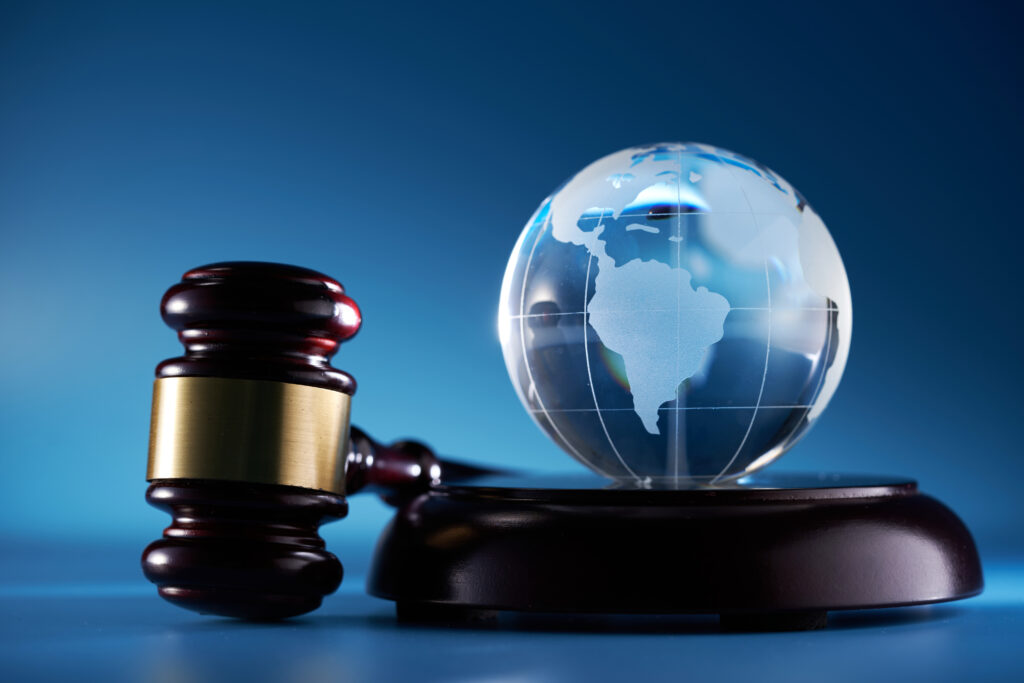Analyses / Middle East / North Africa
16 June 2025
The Denial of International Law at Work

Since the military attack by the Islamic Republic of Iran by the State of Israel during the night of 13 June, we have witnessed a worrying drift in the commentary proliferating on the subject. In a curious reversal of perspective, the country under attack is now presented as the one posing a threat to regional and international order. What is even more troubling is that this narrative comes from the highest levels: Emmanuel Macron, in his statement on 13 June, does not hesitate to echo Israeli rhetoric by affirming Israel’s right to self-defence — a notion that may be formally understood — but then goes on, without flinching, to state that France would be ready to join in operations for the protection and defence of Israel in the event of an Iranian response. We are thus witnessing a complete redefinition of what used to constitute international law: in a thoroughly Orwellian logic, the aggressor becomes the victim and it is the former that must be defended. This is a clear endorsement of the law of the strongest and an explicit break with the principles supposedly governing international relations.
We are aware that international law has been undermined for decades by numerous powers, but it seems we are now entering a new phase, based on what Donald Trump’s inner circle calls “alternative truths”. Admittedly, as is his custom, the French President attempts to maintain his traditional “at the same time” position by clarifying that France did not take part in the attack against Iran and “does not share this approach or the necessity of a military operation”, but he immediately adds that the strikes “had effects which go in the desired direction”. These words are heavy with meaning. They reflect an alignment with Israeli positions and express a Westernist and bellicose policy that turns its back on what is likely the view of a majority of the world’s states.
Let us briefly review the main lines of Iranian nuclear policy, since this is presented as the central issue. Following a long and often tense negotiation process, the Islamic Republic agreed in July 2015 to sign the Joint Comprehensive Plan of Action (JCPoA) on the Iranian nuclear programme. This agreement imposed a binding framework on all parties: the five permanent members of the Security Council, Germany, the European Union, and Iran. Every single inspection by the International Atomic Energy Agency (IAEA) conducted in Iran in the following years confirmed Tehran’s strict compliance with its commitments. It was Donald Trump who, during his first term, unilaterally withdrew from the agreement in 2018 and re-imposed sanctions on Iran. Iranian officials responded with patience, awaiting concrete measures from the Europeans to counteract the damaging effects of the U.S. decision — to no avail. Brussels’ posturing led to nothing. It was only in 2019 that Iran, no longer feeling bound by the JCPoA, resumed uranium enrichment. The chronology is essential here, as Iran is constantly accused of failing to comply with the terms of the JCPoA, whereas it was the U.S. withdrawal that largely rendered the agreement void.
Where do things stand today? The Iranian side claims to be pursuing a uranium enrichment programme for civil, scientific and medical purposes. In such cases, uranium may indeed be enriched to 20%. According to the latest IAEA report and expert estimates, Iran currently possesses five tonnes of uranium enriched above 20%, including around 400 kilograms enriched to 60%. For military use, enrichment must reach 90%. Yet the same experts believe that the political — and thus technical — decision to move to that phase has not yet been taken by the Iranian leadership. If such an initiative were to be launched, it would take at least a year to manufacture one or more operational nuclear bombs, involving miniaturisation and delivery processes. This is why Benyamin Netanyahu’s repeated assertions that Iran is an existential threat to Israel are based on a dangerous rhetoric unsupported by the facts.
We are thus confronted today with a logic of preventive war, radically opposed to the foundations of international law, openly claimed and assumed as such by Benyamin Netanyahu — and, more hypocritically and circuitously, by most Western leaders who de facto align with Tel Aviv.
What, then, are the reasons and rationale behind such a decision? If we consider the precise timing, the primary aim was to sabotage the modest negotiation processes underway. First, the sixth round of negotiations between the United States and Iran, scheduled for 15 June in Muscat. Then, the Franco-Saudi initiative planned within the United Nations framework in New York on 18 June, which hypothetically envisaged the recognition of the State of Palestine. The likelihood of success for either of these processes was indeed limited, but still too much for Benyamin Netanyahu, who believes only in the use of military force to resolve political disputes. This stance is fully assumed: he boasted in October 2024 of being at war on seven different fronts. In this respect, Israel is the main destabilising power in the Middle East and, more broadly, in international relations.
The policy pursued by the Israeli Prime Minister has been known for a long time and is, without a shadow of a doubt, reprehensible. What is profoundly concerning lies in the pusillanimity of the so-called international community. A genocide is underway in Gaza, an unprovoked aggression has been committed against Iran, and yet the Western powers offer virtually no condemnation, allowing Israel to enjoy a sense of impunity and continue its reckless escalation. The states of the Global South, in their diversity, are indeed more critical and condemn the ongoing Israeli operations. Still, it would be welcome for them to coordinate and launch initiatives to halt the slow disintegration gripping the planet. This concerns the kind of future we wish for the world: the law of the strongest versus a revival of the principles of international law.

